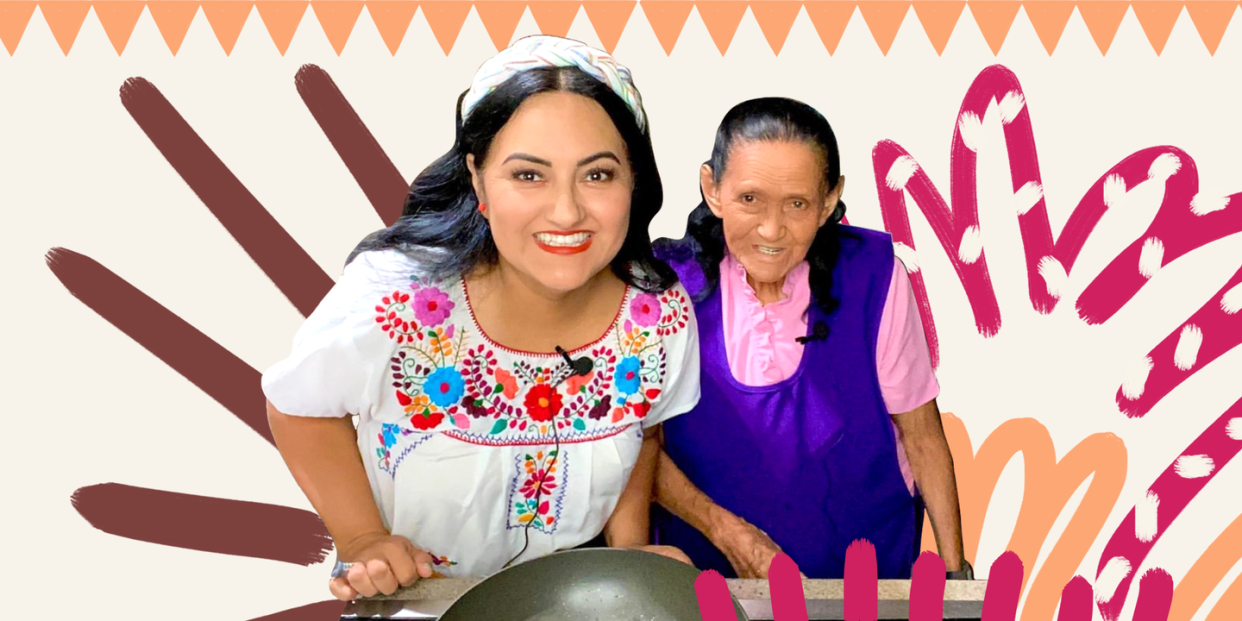'To Cope With Monumental Loss, I Began To Create In The Kitchen Again'

Try as she might, Silvia Salas-Sanchez often struggled to emulate the cooking of her abuela (“grandma” in Spanish). One recipe, in particular, felt impossible to figure out.
“I was watching her make tortillas de harina (or wheat tortillas, versus traditional corn), and I was thinking, ‘Man, as much as I try, I cannot make my tortillas like hers,’” Salas-Sanchez recalled. “When I would make them, they always came out hard and looked like chupacabras (a Latin-American Sasquatch) and UFOs—all these shapes—instead of looking like a tortilla!”
Tortillas are an everyday staple for Salas-Sanchez. A cornerstone of northern Mexican cuisine, they’re used for countless dishes, including burritos, fajitas, tacos, huevos rancheros, and more. Being Mexican and perfecting one’s tortilla-making skills is a kind of rite of passage. You learn the practical know-how, of course: the ideal flour-to-water ratio, how much salt to sprinkle, and when to flip them over on the stovetop (pan optional, if you’re cooking with gas, per my Mexican father’s approach).
But to make tortillas is to also craft connections that span across cultures and generations. On that fateful day more than a decade ago, Salas-Sanchez realized she didn’t want to waste any more time not taking part in that sacred ritual.
Sharing Abuela’s Kitchen with the world
“My children were starting to get a little older, and I really wanted to make the tortillas for them, and for them to enjoy it if my abuela was ever gone,” she said. “I wanted generations to come to have that firsthand experience of what it was like to have abuela’s home-cooked meal. Because as each generation passes, certain things are lost. I wanted to be able to kind of immortalize my abuela.”
And so, Salas-Sanchez began recording her abuela, Maria Rico Contreras—who was originally from Purépero, Michoacán—in the kitchen so that she could capture those recipes and learn how to reproduce them for her kids. At first, her abuela was not all that keen on the idea.
“I was like, ‘Abuela, can I record you making the tortillas?’ and she was like, ‘No! You’re not going to record me, get out of here,’” Salas-Sanchez says, laughing. “We had that relationship where we could be so open and just tell each other whatever.”
Ultimately, Salas-Sanchez convinced her abuela to get on board, and Abuela’s Kitchen, a YouTube channel where she shares the videos, was born. The positive reception the videos quickly garnered motivated her abuela to continue with their new content-creation endeavor. People sent messages detailing how much they enjoyed seeing the grandma-granddaughter duo working alongside each other in the kitchen.
‘They loved the family connection [and] my abuela because it reminded them of theirs,” she said. “That was why we kept creating these videos. It started off as a way for me to capture my abuela and immortalize her and get her recipes, and it turned into more than just that. It turned into culture and family and heritage and so many things—I’m actually super amazed at what it turned into.”
Mastering the recipes of generations past
Every video was a chance to dig into “all the little details” in her abuela’s cooking that she had never paid attention to before. For Salas-Sanchez, the aha moments—like learning to add water to pork before browning it—demystified the cooking process. Once a novice in the kitchen, through preparing meals under her abuela’s watchful eye, she became more comfortable wielding a cutting knife and mixing ingredients.
“There is a science, almost, behind cooking,” she said. “Every meal, now, is an adventure for me: How can I get an expression out of those I’m serving, so that they can leave my home satisfied?”
It’s a philosophy that she likely inherited from her abuela. Ever the consummate host, she was always ready to feed guests and welcome them into her home. When they were under her care and hospitality, they were in good hands.
“She just loved giving,” says Salas-Sanchez. “She was super shy at first, [but] eventually she was the one who was like, ‘Are we recording? Are we recording?’ She got over the shyness. She was a natural on the camera until the end.”
Coping with grief through creativity
On December 25, 2021, Salas-Sanchez’s abuela passed away at the age of 87. The magnitude of the loss remains impossible to articulate for Salas-Sanchez, who took some time to step away from the beloved platform she had built with her abuela over the course of nearly ten years when she passed.
She admits to feeling lost and unsure about how to press forward. What is Abuela’s Kitchen without Abuela? The answer still eludes Salas-Sanchez, but she expressed a desire to keep searching for it, no matter how challenging the journey ahead may be.
“It was very hard to get back into the kitchen just because that was our happy place,” she said. “It changed for me. But as time has gone by, I’m moving back into the kitchen, and the food that I create, you know, it all has a little bit of her.”
Followers showed their support for Salas-Sanchez as she returned to the kitchen. Initially, she began by resurfacing her abuela’s old recipes and sharing behind-the-scenes stories and anecdotes associated with those recipes.
“That’s how I continue to keep her memory and her legacy alive,” she said. “All the messages I have received from our audience are the things that push me to continue to just share. Because this is something that my abuela would have wanted. And so, as a means to cope, I began to create again.”
When you’re part of a community, she explained, it strengthens your character. And when you have elders within that community, they serve as bridges not only to your past, but to your future. With Abuela’s Kitchen, Salas-Sanchez created a space where people could not only discover delicious food, but also pay tribute to the value and wisdom that elders bring into our world.
“There was a time where I wasn’t a part of my elders’ lives because I was going to school and when you’re growing up, you don’t take your grandparents out to party with you,” she said. “You don’t think they could be part of that.” Salas-Sanchez hopes that Abuela’s Kitchen continues to encourage people to connect with their grandparents in whatever way makes sense for them. Don’t count them out, and don’t wait to get them involved. “In all honesty, I’ve learned they can pretty much be part of anything you will allow them to be a part of.”

Try this recipe from Salas-Sanchez’s abuela: Sopita de coditos con pollo (chicken soup with little elbows)
Ready in 30-40 minutes
Serves 5-6 people
Ingredients
3 pounds of chicken
1 onion
2 garlic cloves
Salt to taste
2 cups of macaroni
Lard or oil
1 ? tomatoes
? cup of cilantro
Sour cream
Preparation
Cook chicken in a pot with enough water to cover chicken. Add ? an onion, 2 garlic cloves and salt to your liking.
Cook chicken for 15 minutes before adding pasta.
In a pan with lard or oil, brown the pasta slightly.
Add ? of an onion to pasta and brown for 1 minute.
Add the tomatoes (sliced) to pasta and cook until the tomato is soft.
Add the pasta, onion and tomato to the pot with the chicken.
Mix well, cover and cook until pasta is soft.
Salt to taste.
When the pasta begins to soften, add cilantro.
Serve. Add sour cream if you’d like.

This story was created as part of From Our Abuelas in partnership with Lexus. From Our Abuelas is a series running across Hearst Magazines to honor and preserve generations of wisdom within Latinx and Hispanic communities. Go to oprahdaily.com/fromourabuelas for the complete portfolio.
You Might Also Like